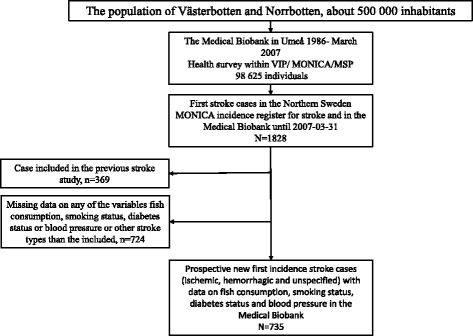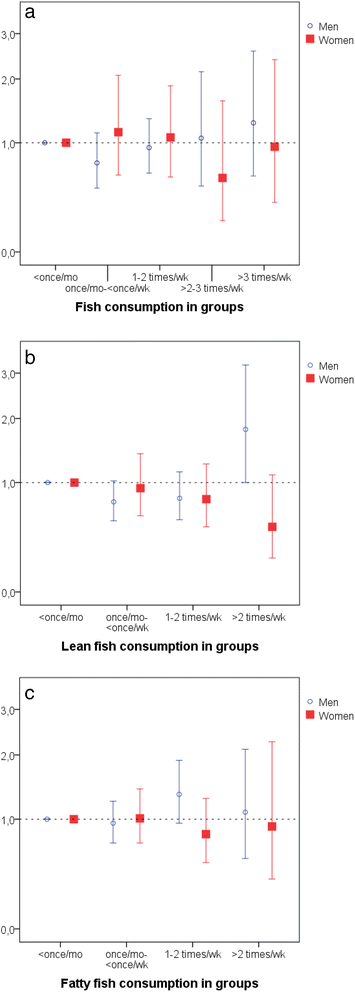Fish consumption and risk of stroke: a second prospective case-control study from northern Sweden
- PMID: 27852254
- PMCID: PMC5112685
- DOI: 10.1186/s12937-016-0216-3
Fish consumption and risk of stroke: a second prospective case-control study from northern Sweden
Abstract
Background: Fish consumption has been concluded to be associated with decreased risk of stroke in several reviews. However, among men, but not women, an increased risk of stroke was previously found at high fish consumption (>3 meals/week) in northern Sweden. This study investigates if previous results on elevated stroke risk with high fish consumption in men in northern Sweden can be confirmed in a larger study with new cases in the same population.
Methods: A prospective nested case-control study was performed within the population-based Northern Sweden Health and Disease Study cohort. Information on fish consumption, other lifestyle and medical data was collected at baseline. Incident stroke cases (1987-2007, n = 735) were identified and 2698 controls matched for gender, age, year of baseline and geographical region.
Results: There were no associations between total fish or fatty fish consumption and stroke risk; thus the previous finding of increased risk of stroke with high fish consumption in men could not be repeated. High intake of lean fish (>twice/week compared to < once/month) was associated with increased stroke risk in men [OR 1.80 (95% CI 1.00, 3.21), but not in women [OR 0.50 (95% CI 0.24, 1.10)]. The association was driven by men living alone.
Conclusions: The previous association between high total fish consumption and risk of stroke in men could not be repeated. The increased risk found in men with high intake of lean fish may be due to chance or confounding specific for this group.
Keywords: Confounding; Fish consumption; Hemorraghic stroke; Ischaemic stroke; Lifestyle.
Figures


References
-
- Wang C, Harris WS, Chung M, Lichtenstein AH, Balk EM, Kupelnick B, Jordan HS, Lau J. n-3 Fatty acids from fish or fish-oil supplements, but not alpha-linolenic acid, benefit cardiovascular disease outcomes in primary- and secondary-prevention studies: a systematic review. Am J Clin Nutr. 2006;84:5–17. - PubMed
Publication types
MeSH terms
LinkOut - more resources
Full Text Sources
Other Literature Sources
Medical

